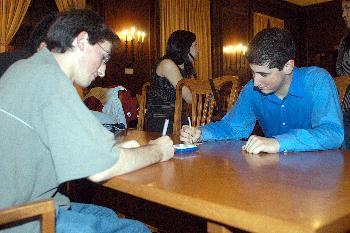
It Boggles the Mind
Two clubs. Two names. One acronym. There’s only one way to settle a dispute like this: Boggle.
For weeks earlier in the semester, Francisco Aguilar ’05, president of the Social Enterprise Club, and Aaron J. Greenspan ’05, president of the new Student Entrepreneurship Council, battled to enter the SEC acronym for their respective clubs in Harvard’s official registry of student groups. “SEC is more than just letters—it’s letters that stand for something,” says Aguilar.
The Social Enterprise Club was founded in April 1999 to promote awareness about “combining business and social objectives.” The Student Entrepreneurship Council, founded in 2002, seeks to promote entrepreneurship among Harvard students and has also designed and implemented houseSYSTEM, a new online portal for the upperclass Houses.
These two groups, with similar missions and even more similar names, have since resolved their differences, with Greenspan deferring to history and agreeing to let the older Social Enterprise Council keep the acronym. FM invited the presidents of both clubs to try to bury the hatchet over a friendly game of Boggle (FM’s official board game).
Playing under modified Boggle rules, Aguilar and Greenspan searched the board for acronyms. After one minute of fruitless searching, the Boggle board was re-shaken and they began to play under standard rules.
Both players tried a few tricks. Greenspan attempted to sneak the word “queasy” onto his list, despite the fact that not all of the letters in the word were touching on the game board. Aguilar tried using the word “syke,” despite the fact that the word does not exist.
Fittingly, in the end, the two competitors each came up with five unique words, all of three or four letters. The final score was 5 to 5, and unfortunately, no bragging rights were awarded. “[The Boggle match] was much like the Cuban Missile Crisis—except without the missiles, danger of global annihilation or Castro, and it happened in Cambridge,” says Aguilar. However, both presidents can report back to their clubs that they demonstrated some board game entrepreneurship, if not a downright willingness to cheat, in their quest for Boggle glory.


